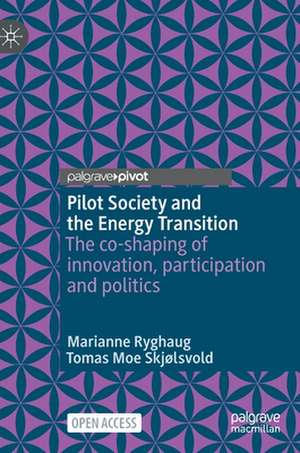Pilot Society and the Energy Transition: The co-shaping of innovation, participation and politics
Autor Marianne Ryghaug, Tomas Moe Skjølsvolden Limba Engleză Hardback – 24 noi 2020
Preț: 233.51 lei
Nou
Puncte Express: 350
Preț estimativ în valută:
44.68€ • 46.82$ • 36.94£
44.68€ • 46.82$ • 36.94£
Carte tipărită la comandă
Livrare economică 11-25 aprilie
Preluare comenzi: 021 569.72.76
Specificații
ISBN-13: 9783030611835
ISBN-10: 3030611833
Pagini: 130
Ilustrații: VII, 130 p.
Dimensiuni: 148 x 210 mm
Greutate: 0.34 kg
Ediția:1st ed. 2021
Editura: Springer International Publishing
Colecția Palgrave Pivot
Locul publicării:Cham, Switzerland
ISBN-10: 3030611833
Pagini: 130
Ilustrații: VII, 130 p.
Dimensiuni: 148 x 210 mm
Greutate: 0.34 kg
Ediția:1st ed. 2021
Editura: Springer International Publishing
Colecția Palgrave Pivot
Locul publicării:Cham, Switzerland
Cuprins
Chapter 1: Transforming society through pilot and demonstration projects.- Chapter 2: The co-production of pilot projects and society.- Chapter 3. Democratic and participatory pilot projects?.- Chapter 4: Catering for socio-technical transformations: rethinking technology policy for inclusive transformation.
Notă biografică
Marianne Ryghaug is a professor of Science and Technology Studies at the Norwegian University of Science and Technology where she leads the research group on Energy, Climate and Environment. Over the last twenty years, her work has focused on the linkages between energy and climate policy, technological development and innovation, and public participation.
Tomas Moe Skjølsvold is a professor of Science and Technology Studies at the Norwegian University of Science and Technology. He is the deputy director of the Norwegian Centre for Energy Transition Strategies (NTRANS) and has published extensively on socio-technical aspects of energy transitions, as well as scientific processes within climate and sustainability science over the last years.
Textul de pe ultima copertă
"This important book interrogates scholarship on sustainability transitions with insights from Science and Technology studies (STS) by focusing on pilot projects. The book urges us to look beyond technological solutionism, to examine how the energy transition also requires experimentation and even transformation in social domains. This is a valuable contribution to discussions about how to make energy transitions just, fair and more humane, and it will be an important resource for students and scholars alike. Highly recommended!"
- Benjamin K. Sovacool, University of Sussex, UK and Aarhus University Denmark
This open access book examines the role of pilot and demonstration projects as crucial devices for conducting innovation in the context of the energy transition. Bridging literature from sustainability transitions and Science and Technology Studies (STS), it argues that such projects play a crucial role, notonly in shaping future energy and mobility systems, but in transforming societies more broadly. Pilot projects constitute socio-technical configurations where imagined future realities are materialized. With this as a backdrop, the book explores pilot projects as political entities, focusing on questions of how they gain their legitimacy, which resources are mobilized in their production, and how they can serve as sites of public participation and the production of energy citizenship. The book argues that such projects too often have a narrow technology focus, and that this is a missed opportunity. The book concludes by critically discussing the potential roles of research and innovation policy in transforming how such projects are configured and conducted.
Marianne Ryghaug is a professor of Science and Technology Studies at the Norwegian University of Science and Technology where she leads the research group on Energy, Climate and Environment. Over thelast twenty years, her work has focused on the linkages between energy and climate policy, technological development and innovation, and public participation.
Tomas Moe Skjølsvold is a professor of Science and Technology Studies at the Norwegian University of Science and Technology. He is the deputy director of the Norwegian Centre for Energy Transition Strategies (NTRANS) and has published extensively on socio-technical aspects of energy transitions, as well as scientific processes within climate and sustainability science over the last years.
Caracteristici
Explores key theoretical debates within social scientific studies of energy transitions Links innovation, participation and citizenship in a novel way Examines the role of pilot and demonstration projects in innovative energy transitions This is an Open Access Book
